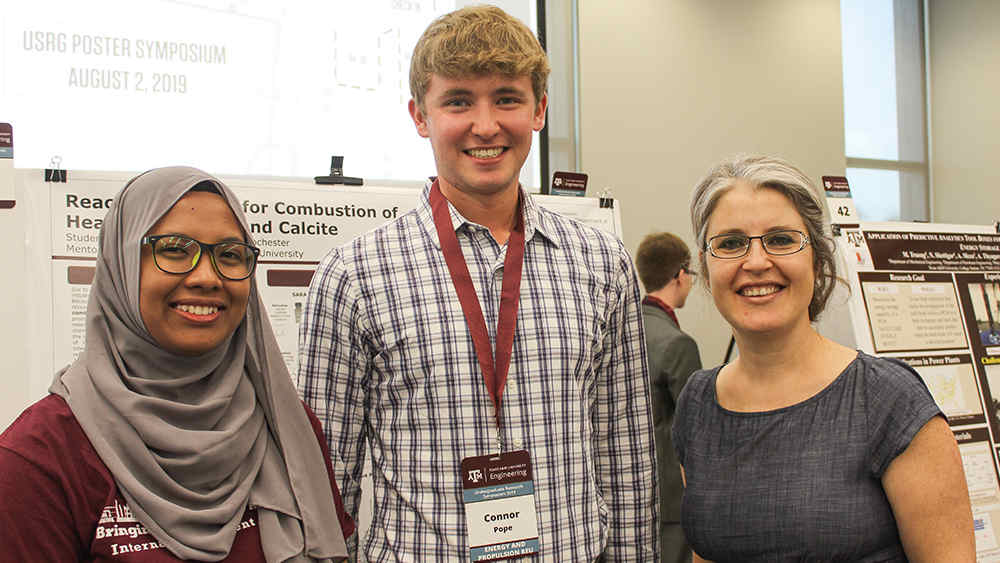
For the past three years, Dr. Berna Hascakir has been involved in a program funded by the National Science Foundation (NSF) that allowed her to teach the basics of research to three undergraduate students from schools other than Texas A&M University. The program, Research Experiences for Undergraduates (REU), lets students participate in projects provided by sites or researchers around the country that are interested in promoting student engagement.
Hascakir, Flotek Industries, Inc. Career Development Professor in the Harold Vance Department of Petroleum Engineering, works with students through the Texas Center for Undergraduate Research in Energy and Propulsion REU site. This site is a collaboration between Texas A&M and The University of Texas at Brownsville that focuses on alternative fuels, energy conversions and storage, and various propulsions.
All three students who participated in the program, Connor Pope and John Siu from the University of Rochester and Elizabeth Seber from Pennsylvania State University, had no prior experience working in the field of petroleum engineering. Nor were all of them engineering majors, as Seber studies mechanical engineering, Siu studies physics and Pope studies chemical engineering.
Each student worked one summer with Hascakir and her graduate student Norasyikin Ismail to investigate a project on enhancing oil recovery from unconventional heavy oils using thermal methods, and the reactions of aromatic or resin properties present in reservoirs to those methods. The collaborations proved beneficial for everyone, including Hascakir.
“It was a very good experience to work with students with different backgrounds and from different universities,” said Hascakir. “It enlarges the research vision.”
Pope, the most recent student, worked in the Richardson building at Texas A&M for 10 weeks over the 2019 summer. He learned to use equipment and materials in labs under Hascakir and Ismail’s supervision and guidance to understand why many in-situ combustions are unsuccessful in enhancing oil recovery and how aromatic and resin reactions can be involved.
Results from the procedures were modeled analytically to obtain reaction parameters. At the end of the experience, Pope showcased the work he had done and won first place in his session during the poster presentations held in the Zachry Engineering Education Complex in August.
“Research is vastly different from classroom learning, as what we learn in the classroom is theoretical,” said Pope. “During research, a lot can go wrong and it’s important to try and work through it. It's a form of experimenting and working to understand why and how we get those results.”
Hascakir, who is one of two petroleum engineering faculty members at Texas A&M to receive NSF funding, welcomed the opportunity to encourage the potential in these young researchers.
"As we professors advance our knowledge, we forget from time to time how to communicate in the right way with undergraduate students,” said Hascakir. “This program reminded me where I came from, taught me how to simplify my research area and showed me how an undergraduate student can help me progress in my research. Also, REU proved to me again the power of interdisciplinary research.”
The project resulted in six papers. Two were submitted to the 2020 Society of Petroleum Engineers (SPE) Heavy Oil Conference in Calgary, Canada, and the 2020 SPE Improved Oil Recovery Conference in Tulsa, Oklahoma. The other four papers are listed below:
- Ismail, N., Seber, E., Hascakir, B. 2018. Water and Aromatics Fraction Interaction at Elevated Temperature and Their Impact on Reaction Kinetics of In-situ Combustion. Journal of Petroleum Science and Engineering, Volume 169, Pages 24-32, October 2018.
- Ismail, N., Siu, J., Hascakir, B. 2018. Kinetics Analysis Validation for In-Situ Combustion by Coupling Experimental Data with Analytical and Numerical Methods. Paper SPE-191745-MS, presented at the SPE Annual Technical Conference and Exhibition, Dallas, Texas, USA, September 2018.
- Ismail, N.B., Seber, E., Hascakir, B. 2018. Role of Aromatics Fraction of Crude Oil on In-Situ Combustion Performance. Paper SPE-190307-MS, presented at the SPE Improved Oil Recovery Conference, Tulsa, Oklahoma, USA, April 2018.
- Ng, A., Seber, E., Ovalles, C., Benson, I.P., Hascakir, B. 2018. The Use of Asphaltenes Precipitants and Environmentally Friendly Solvents During Solvent-Steam Processes. Paper presented at the SPE/EAGE Tar Mats & Heavy Oil Workshop: Fluid Characterization and Development/Operational Challenges, Dubai, UAE, January 2018.